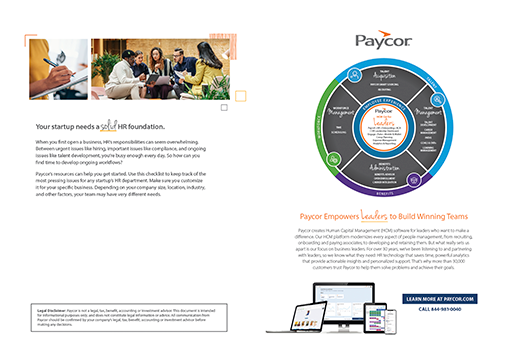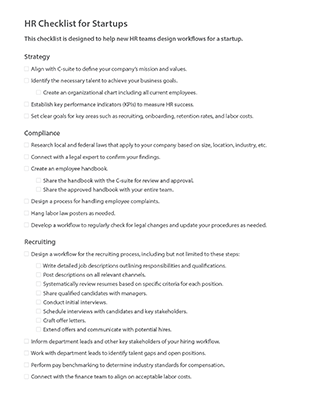Ensure HR Needs are Met for Startups
When you’re starting a business, HR might be the last thing on your mind. You could be busy getting investors, finding a space, sourcing products, designing your website…the list goes on and on. You probably have limited resources, and everything feels urgent. But for your company to be successful, you can’t sustain that pace for long. Ironically, if you want more time in your day, you need to step back from what’s urgent and think about what’s important.
HR workflows are important for any business, especially a startup. These processes empower you to build your dream team. And without a great workforce, how can your company succeed?
In this article, you’ll get some key pointers for how to set up an HR department – including a free checklist you can use to get started!
Start with Strategy
Before you dive into specific HR functions, take the time to define your overall strategy. Like any business strategy, it should align with your company’s mission, values, and business goals. For example, what kind of company culture do you want to create? What talent does your team need in order to achieve your KPIs? How will you measure HR success? Answering these questions will help you decide which specific tasks to prioritize.
Foster Company Culture
A strong company culture attracts top talent, fosters innovation, and drives engagement. It’s harder to measure than your retention rate or total benefits utilization, but it’s the key to planning HR for startups.
While HR sets the tone for corporate culture, it’s always a group effort. Every one of your employees will play a role, from the C-suite to frontline workers. To foster a supportive, productive culture, start by clearly defining your startup’s mission and values. Share those ideals with every new hire in the onboarding process. This is a great way to get emotional buy-in from everyone on your team, encouraging them to work together toward a common goal.
Recruit Top Talent
Attracting top talent can be a challenge for startups. Your company doesn’t yet have name recognition, or long-term employees who can refer new candidates. Instead, you’ll need to rely on recruiters to create and maintain a pipeline. With a strong HR team, this is a very achievable goal.
Start by defining your ideal job candidate, including their skills, availability, and required credentials. Then, create a clear workflow for how you’ll attract and communicate with potential hires. For example, who will be involved in the hiring process? Is there a style guide for writing job descriptions? Are you required to publicly disclose a salary range? How many interviews will you perform? Answer these questions before you begin the hiring process.
Onboard New Hires
Did you know that 64% of new hires quit their jobs because of poor onboarding (Zippia)? This process is the first step toward long-term employee engagement and retention. Well before you hire your first team members, HR should develop a schedule for onboarding employees. What milestones will they accomplish in the first week, month, 90 days, etc.? Make sure you define success, so you can communicate their short-, medium-, and long-term goals from day one.
Create a Benefits Package
Depending on your company’s size and location, you may be legally required to offer certain benefits. But your benefits strategy is more than a legal compliance issue. By offering non-traditional options, you can appeal to a much larger talent pool.
This is especially important if you’re hoping to attract younger workers, who may be especially excited to work for a startup. Every generation wants more benefits than the previous one (National Association of Plan Advisors). Budget permitting, you could offer a wellness program, an equipment stipend, or any other perks that align with your company values.
Plan for Talent Development
A staggering 94% of employees would stay at a company longer if they had effective learning opportunities (Zippia). At an established company, it’s easy to see how training programs could lead to employee engagement, promotions, and long-term retention. So why does this matter for startups?
We’re living through a time of unprecedented change. Workers are concerned about proliferating AI tools, employers are worried about the labor shortage, and it’s harder than ever to plan for the future. Training your team sends the message that you care about their careers and you see them as an important investment. It also fosters an innovative spirit, which is essential for any new business.
Of course, there’s more to talent development than upskilling. HR should also schedule regular performance reviews, help employees set career goals, and design a fair compensation strategy to boost long-term retention.
Address Compliance Issues
Compliance is one of HR’s most important functions, partly because it’s so complex. An effective HR plan for a startup company organization has to comply with certain regulations, or you’ll face fines and possibly even civil or criminal charges. However, the specific laws that apply to your company vary depending on a long list of factors, including but not limited to your company size, location, industry, number of employees vs. independent contractors, and even calendar year.
HR is responsible for working with the legal team to keep your business compliant. In smaller businesses – and HR for startups – you may have to work with an outside attorney or legal consultant instead of an in-house expert. Either way, remember that compliance issues are constantly changing. Your HR calendar should include annual reminders to review changing local and federal regulations and update your company policy accordingly.
How Paycor Helps
Paycor’s HR software is purpose-built to support HR’s most important functions. These tools empower leaders to perform essential tasks in every stage of the employee life cycle, from hire to retire. From recruiting tools to Talent Development and beyond, our HCM solution can help your startup grow into a successful, sustainable business. Download our HR Checklist for Startups to get started today!











